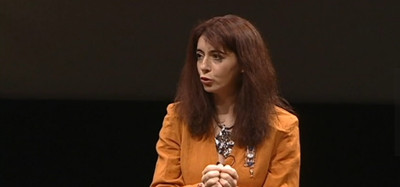And so on. There is a little bit of a difference there that is worth just thinking about.
等等...但即便是有些許的不同,那也值得仔細(xì)想一想。
And I remember when I was 12 years old,and I started playing tympani and percussion, and my teacher said,Well, how are we going to do this? You know, music is about listening.
我記得在我12歲的時(shí)候,我開始演奏定音鼓和打擊樂,我的老師說,我們怎么開始去做呢? 你知道,音樂與聽是密切相關(guān)的。
And I said, Yes, I agree with that. So what's the problem?
當(dāng)然,我同意您的觀點(diǎn)。所以問題在哪呢?

And he said, Well, how are you going to hear this? How are you going to hear that?
他說:那么,你怎樣來聽這個(gè),怎樣來聽那個(gè)呢?
And I said, Well, how do you hear it?
我說:那么,您是怎樣聽的呢?
He said, Well, I think I hear it through here.
他說:我想我是通過這兒來聽的。
And I said, Well, I think I do too-but I also hear it through my hands,through my arms, cheekbones, my scalp, my tummy, my chest, my legs and so on.
我說:我想我也是,但是我還通過我的手來聽。以及我的手臂,顴骨,頭皮,胃,胸部,我的腿等等。
And so we began our lessons every single time tuning drums in particular, the kettle drums, or tympani to such a narrow pitch interval, so something like ...
從那以后,每節(jié)課的一開始,我們都會調(diào)整鼓,尤其是定音鼓,使其處于很窄的音域里,就像這樣。
that of a difference. Then gradually ...and gradually...and it's amazing that when you do open your body up,and open your hand up to allow the vibration to come through,that in fact the tiny, tiny difference...
有些許不同 。然后逐漸的變化,一點(diǎn)一點(diǎn)地,令人驚奇的是,當(dāng)你的身體完全打開,張開雙手使震動穿過,事實(shí)上,極為微小的不同。
can be felt with just the tiniest part of your finger, there.
都可以被你手指上最微小的部分感知。
And so what we would do is that I would put my hands on the wall of the music room, and together we would listen to the sounds of the instruments,and really try to connect with those sounds far, far more broadly than simply depending on the ear.
因此,我們常做的就是我會把雙手貼在音樂教室的墻上,這樣就能聽到樂器所發(fā)出的聲音,仔細(xì)地感受那些聲音,效果遠(yuǎn)遠(yuǎn)好于只是依靠耳朵。











